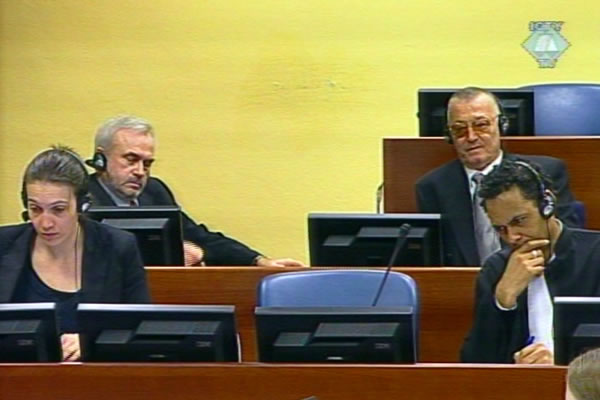Home
HOW WILL TAYLOR’S JUDGMENT AFFECT STANISIC AND SIMATOVIC?
The prosecution has asked for parts of the judgment issued by the Special Court for Sierra Leone in Charles Taylor’s case to be admitted into the case file in the appellate proceedings of Jovica Stanisic and Franko Simatovic. The defense has opposed their motion in part. The judgment has emphatically rejected ‘specific direction’ as a requirement for a conviction for aiding and abetting, thus running counter to recent jurisprudence at the Tribunal
 Jovica Stanisic i Franko Simatovic in the courtroom
Jovica Stanisic i Franko Simatovic in the courtroom The latest judgments rendered by the Tribunal in The Hague have not influenced the conclusions of the Appeals Chamber of the Special Court for Sierra Leone, but the latter may well influence the former. The prosecution has asked that parts of the appellate judgment confirming the 50-year prison sentence for the former Liberian president Charles Taylor be filed as supplementary authority in the appellate proceedings of Jovica Stanisic and Franko Simatovic.
In its judgment in Taylor’s case, the Appeals Chamber of the Special Court for Sierra Leone ignored the conclusions in the Tribunal’s acquittal of General Momcilo Perisic. In Perisic’s appellate judgment, the judges found that in order to convict an accused of aiding and abetting, it was necessary to prove that there was ‘specific direction’ of the acts and behavior of the accused towards the commission of the crimes. One of the Tribunal’s trial chambers applied the same principle and acquitted the two former Serbian State Security Service chiefs, Stanisic and Simatovic, of aiding and abetting. The prosecution contends that the analysis produced by the appellate judges in Taylor’s case would be of use in Stanisic’s and Simatovic’s appellate case. Consequently, the prosecution has filed a motion asking for 70 pages of the appellate judgment in the case against the former Liberian president to be admitted into the case file as a supplementary authority.
Jovica Stanisic’s defense has partially opposed the admission of the findings in Taylor’s judgment in the case file, as it considers they are irrelevant for the case; according to the defense, they do not pertain to ‘specific direction’. The only part of the judgment that does address the issue of ‘specific direction’ is an ‘obiter conclusion’ made by the Appeals Chamber in Taylor’s case that ‘there are no cogent reasons’ why they should deviate from the Statute of the Court and the provisions of international customary law. According to those provisions, specific direction is not an element of the crime of aiding and abetting. The defense has opted against assessing “the limits of the persuasive value” of this ‘obiter conclusion’, addressing for now the issue of its relevance. If this part of the judgment is appended to the case file in the case against Stanisic and Simatovic, the defense reserves “the right to make detailed submissions” on the issue.
Judge Meron’s Appeals Chamber will rule on the motions filed by the prosecution and defense. Meron was the presiding judge in the chamber that acquitted Perisic in February, by applying the ‘specific direction’ standard, of crimes in Croatia and BH. Taylor’s judgment has rejected this standard, and the prosecution now wants Meron and his Appeals Chamber to reconsider their earlier finding and admit that they were wrong.
Jovica Stanisic and Franko Simatovic are charged with participation in a joint criminal enterprise whose goal was to ethnically cleanse large areas in Croatia and BH. The units under their control contributed to the implementation of that goal. The Trial Chamber acquitted the pair of all charges in its judgment rendered on 30 May. The charges against them included aiding and abetting. The prosecution has appealed, calling for their conviction and adequate punishment.
Linked Reports
- Case : Stanisic & Simatovic
- 2013-09-27 PROSECUTION: JUDGES TO SENTENCE STANISIC AND SIMATOVIC OR TO REMAND THE CASE
- 2013-06-28 PROSECUTION TO APPEAL STANISIC AND SIMATOVIC JUDGMENT
- 2013-06-03 STANISIC AND SIMATOVIC JUDGMENT IN ‘DARK AREA’ OF INTERNATIONAL LAW
- 2015-06-13 APPELLATE HEARING IN SIMATOVIC AND STANISIC CASE SCHEDULED FOR 6 JULY 2015
- 2015-07-06 ARGUMENTS FOR AND AGAINST ACQUITTAL IN STANISIC AND SIMATOVIC CASE
- 2015-11-03 FINAL JUDGMENT FOR STANISIC AND SIMATOVIC ON 15 DECEMBER 2015
